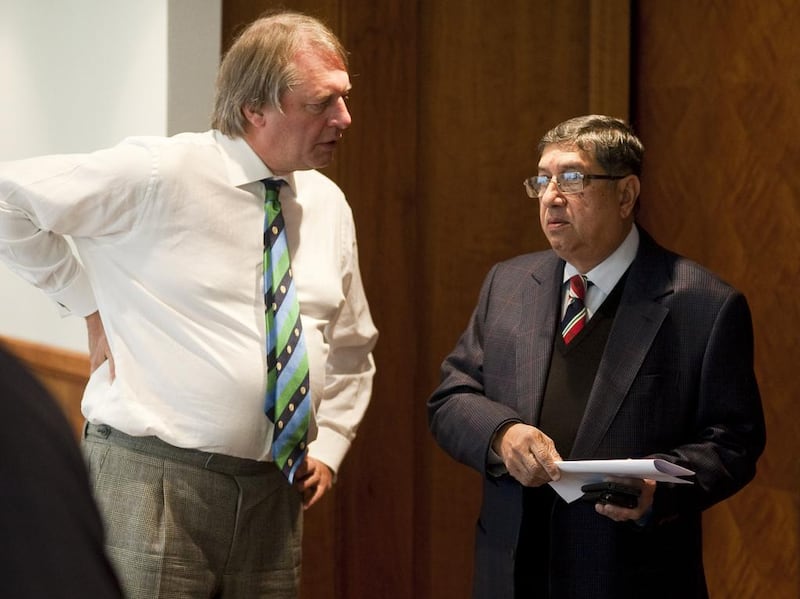DUBAI // Cricket's full members will today begin an official meeting over a number of reworked resolutions tabled by the "Big Three" boards from Australia, England and India.
The resolutions, emanating from a draft report prepared by Cricket Australia (CA), the England & Wales Cricket Board (ECB) and the Board of Control for Cricket in India (BCCI), are set to bring about seismic change in the way cricket is governed and the spoils of its economy split.
The two-day meeting has been preceded by a far more significant three days of sideline wheeling and dealing between the seven smaller boards and the big three.
Four of the smaller boards – from South Africa, Sri Lanka, Bangladesh and Pakistan – have formed a loose opposition to the changes. That opposition, according to one official from the big three, would appear to have drawn some concessions.
The idea of a system of promotion and relegation, the official told The National, might even be dropped altogether, a move which would appease the Bangladesh Cricket Board (BCB), for whom the issue was a major one.
But there appears even to be a softening of sorts on the revenue distribution model; in the report, the three boards proposed a model whereby they stood to benefit the most financially from a new system which would recognise their greater financial contribution to the game.
The proposed model might not change in specifics, but it may be open to “further discussion. Not too much, but around how it would actually work in reality and what guarantees there might be”. These were, the official said, “discussions rather than negotiations”.
There might also be a watering down of another proposal that irked smaller boards. The report called for the creation of an Executive Committee that would be the supreme decision-making body in the International Cricket Council (ICC). It would comprise of permanent members from CA, ECB and the BCCI and a fourth rotating member from the rest.
That may now be tweaked to include one other member, making it a five-member body with two smaller board members on it.
How the smaller boards finally react to these resolutions – and thus how the meeting proceeds – was not clear until even as late as last night, when most boards were still in the middle of meetings. The resolutions had first to go through the ICC’s Finance and Commercial Affairs (F&CA) committee, which was still meeting until early last night.
Only after that would the final resolutions be circulated among the full members; in an indication of how fluid the situation was, it was not even clear to many boards exactly how many resolutions would be tabled. The report initially produced upwards of fifty resolutions, though one version they have has been repackaged into five broad resolutions which might be voted upon today and, if needed, tomorrow.
Over the last three days, led by the BCCI, the big three have been busy trying to bring on board as many of the smaller boards as possible, in a bid to push through the resolutions. In preliminary meetings on Saturday broad stances were laid out, that boards would have to sign on the resolutions to obtain future benefits, particularly in playing against India.
But the pressure has, according to some boards, been ratcheted up over Sunday and yesterday. By early evening yesterday, at least one board had been offered fairly detailed plans of playing India over the next eight years.
“They are saying let’s agree to years and months and how much we want to play,” an official told The National.
“They will create room for us saying we’ll play on a frequent basis.”
The dilemma, as the official pointed out, is that there will be even less guarantees of it happening than at present under the Future Tours Programme (FTP), which the big three want to scrap.
CA and ECB have, however, told other boards they intend to honour the commitments already inked in the current FTP.
Ultimately, despite the apparent concessions, the choices for the four opposition boards remain bleak: side with the big three and short-term benefits may accrue (none of which are guaranteed). Go against them and be prepared to take bigger hits in the short-term in the hope that longer-term rejection of such a plan brings some fruit.
“There is no Plan B,” as the big three official said. “Plan A is have this. Plan B is OK, let everybody take their chance negotiating with India and broadcasters to get the best deal they can. There will be no guarantees.”
There does remain a willingness among the opposition to try to push for delays at the meeting, likely, said one official, on the basis that they would only have seen the actual, final resolutions either late last night or in the meeting today.
Questions, it appears, might be raised on the conflicts inherent in CA, ECB and the BCCI sitting in the meeting and voting for changes from which they benefit; there is also a suggestion that the actions of the three board heads in producing this document could be in conflict of their fiduciary duties, which would constitute a case for the ICC’s ethics officer.
Any legal spoilers are likely to come from CSA, who until Sunday at least, had been isolated by the big three.
They had unsuccessfully asked for the proposals to be withdrawn on constitutional grounds last week but have continued looking at options.
In case matters do come down to a vote, depending on the kinds of resolutions tabled, some will need eight votes out of ten, while others seven, to be passed.
osamiuddin@thenational.ae
Follow us on Twitter at @SprtNationalUAE





